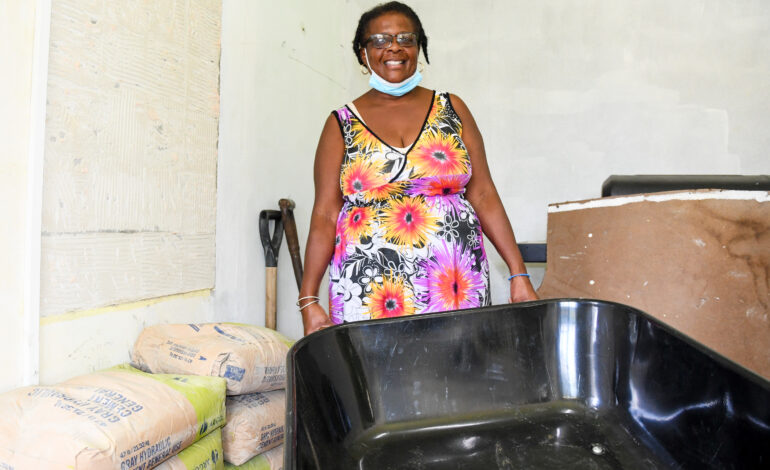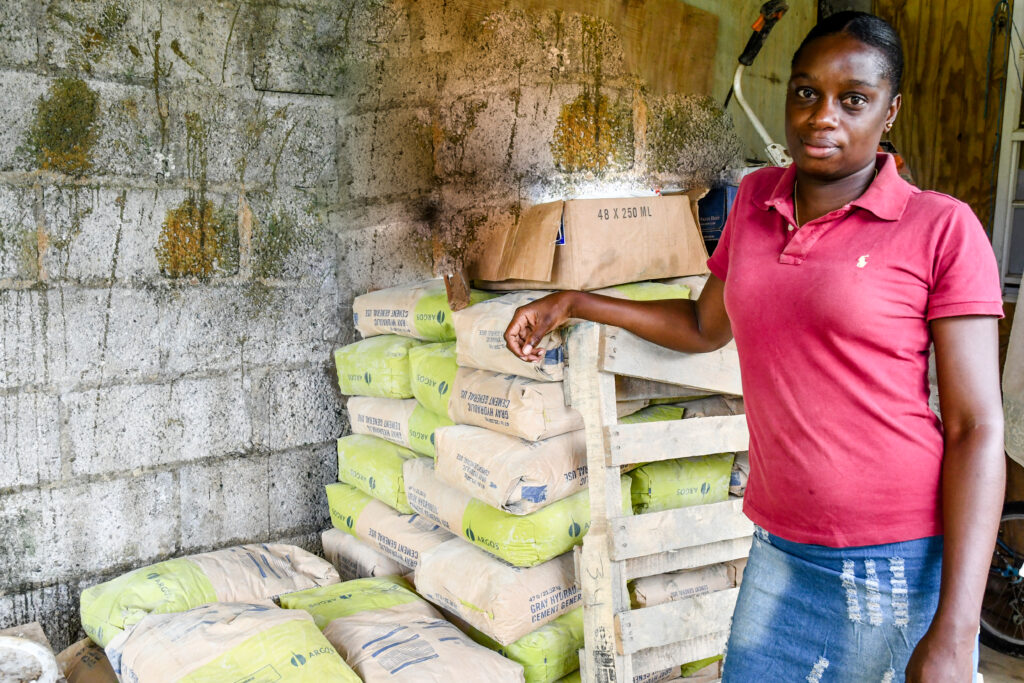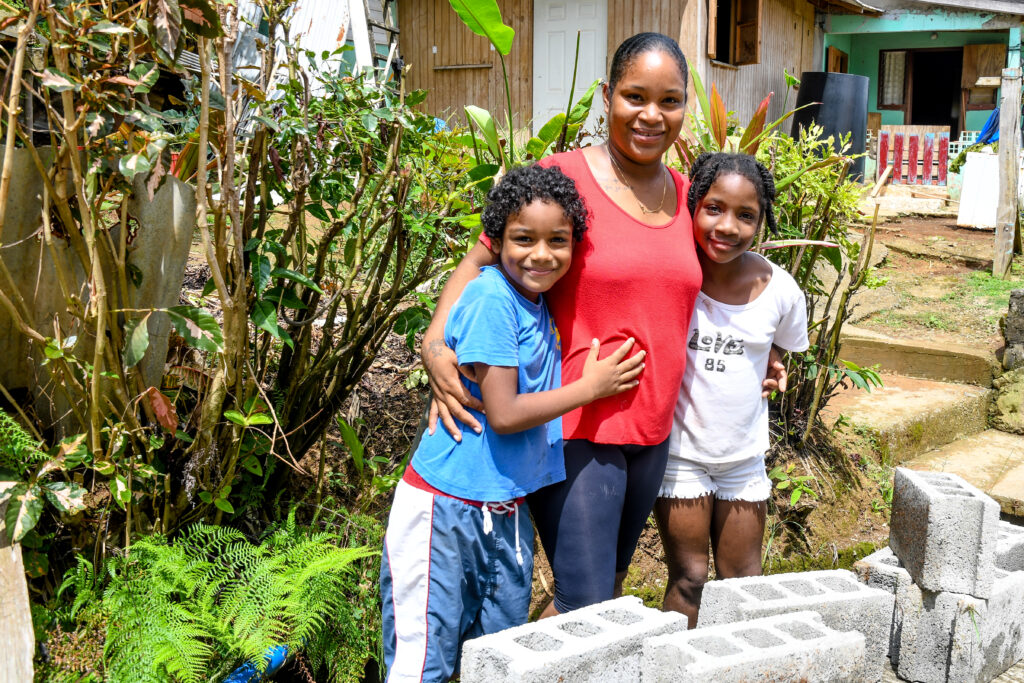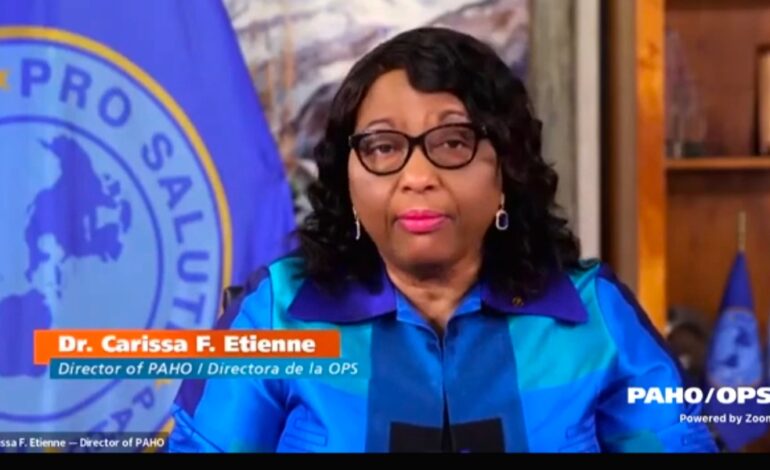
Female farmers in Dominica continue to receive much needed support through one of the microfinance initiatives under the Strengthening
Disaster Management Capacity of Women in the
Cooperative Republic of Guyana and Dominica (GUY-
DOM) Project. With support from the United Nations Development Programme (UNDP) Barbados and the Eastern Caribbean and in collaboration with the Government of Dominica, through funding from the Government of Japan, 79 female and 43 male farmers from four agricultural districts have been provided with farm tools
and materials to assist them in preparing for, mitigating against and adapting to impending farm hazards, such as hurricanes, floods and drought. This number makes up 37% of the total number of farmers expected to benefit from the project; and 65% of those already receiving tools are female.
The materials delivered to date include aggregate, 6″ blocks, cement, chainsaw, chicken wire, hoses, padlocks, rakes, sand, 1⁄2 inch steel, water tank, watering cans and wheelbarrows.

Empowering farmers with tools and materials
This action falls within the project output 2 in which three microfinance offerings are made to farmers. These include:
• The equivalent of US $500 in tools and materials provided to each farmer that the project has trained to prepare and mitigate disasters on their farm.
• Group grants of the equivalent of up to US $10,000 provided to female led farming groups to strengthen their livelihood options and scale up their preparation for adaptation to potential farming disasters
• A revolving fund that offers soft loans to enterprising female farmers. The unique feature of this fund is the combination of parametric insurance, personal mentor services, business development training and strengthening of the lending institution in the areas of gender responsive customer service.
Beneficiary farmers from the parishes of St. David, St Paul, and St. Patrick have been trained in the Participatory Integrated Climate Services for Agriculture (PICSA) methodology which empowers farmers to use climate and weather data to make informed farm decisions.

The following captures some of the feedback from both women and men farmers who were appreciative of the tools and materials provided.
I am very much satisfied with all tools and materials that I have received
D.R. Bellevue farmer
I am quite satisfied, I cannot complain.
G.J. Kalinago farmer
I am very much excited. I have already constructed the structure for my livestock, and I am just awaiting the animals.
N.H. Belles farmer
Farmers were also appreciative of the project’s attention to their needs and the accompanying training, as reflected in their comments on the PICSA training:
Seasonal calendar has been assisting me greatly, they should have these trainings more often because it has helped me so much.
Used the budget plan and I am seeing the results.
It taught me how to make better use of the space available and which crops to plant in certain areas.
Have tried to make use of all the resources, overall, it was quite interesting. Certain things we knew before but with no particular name and through the sessions we got a better understanding of these things.
I never used to count plants or record my harvesting, but I do that now since the training.
Water harvesting, learning about things you can plant during the hot weather that can survive and the levels of water to be used for certain crops to help them survive.
I really enjoyed the training, learning about the climate forecasting was really helpful. Networking with other farmers was really good and helpful also.
I learnt a lot about understanding the weather and record keeping. These have been very useful.
I changed the time that I planted certain crops. For the budget I now take time into consideration and putting aside a salary for myself How to plant, when to plan and how to make manure. The training has helped me a lot, I make my calendar which shows me when to plant and how to plant.
Mulching, using grass to cover the exposed soil instead of throwing it away. The seasonal aspect, knowing when to plant and what to plant on farm.
Preparing for the wet season; drainage so the water has place. Also, for the wet season, how to trap water so that my crops can have enough water for the season.
The budget line helped me a lot, as I used to sell and not keep track. The training has put me on the right track with my record keeping and has enabled me to see my way when I make money
Speaking at a previous handover ceremony, Permanent Secretary in the Ministry of Agriculture Dr. Kyra Paul stated,
“The Ministry continues to be a front liner catering to the needs of its clients through concessions, technical assistance and frequent engagements, in-kind support, AND sometimes under the most difficult times. The well-being of farmers, women and men alike, is our utmost priority! The extension staff aim to meet the needs of our farmers so that the benefits can accrue to the sector and the wider economy. The provision of the tools and equipment is a direct effort of the UNDP as a development partner and the Ministry to close the gender gaps in agriculture, rural employment and access to technology”.
Sawana Fabien, Project Coordinator has this to say about the microfinance intervention of tools and materials
In Dominica our rural, small, women farmers contribute significantly to national food security and the nation’s health. When these farmers take the time to invest in capacity building initiatives with the ultimate aim of building resilience on their farms, these efforts have to be rewarded and sustainably supported. Hence the first prong of the project’s Micro-Finance approach is to provide tools and equipment to all our PICSA participants. We continue to have our challenges with the procurement process; however, the project is committed to ensuring that the farmers’ needs in preparation, adaptation and mitigation of disasters are duly met. We assure each farmer that they will receive their inputs.
Gender
In Dominica, female farmers play a critical role in national food security and the nation’s health but their contributions and needs are not sufficiently quantified. Consequently, their work is undervalued, and their specific gender needs not targeted due to lack of information. For this reason and because women are often first responders during disasters, the project specifically targets female farmers to ensure that their needs in disaster preparation, adaptation and mitigation are duly met.
Visibility Blitz programme of activities
The programme of activities continues with a panel discussion tonight on Micro finance, Value Chain and Climate Smart Agriculture. Our panelists are Kent Coipel, IICA; Francine Baron, CREAD; Nekalia Carai, IICA; Monica Rodgers and Joan Guiste. The discussion will be moderated by Natasha Yeeloy. Join us and encourage others to do so on UWI TV. For further information please contact Project Coordinator Sawana Fabien on 225 1778 or [email protected]




